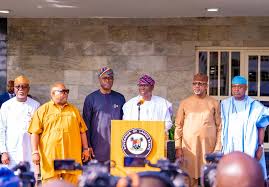Governor of Enugu State, Dr. Peter Mbah, has charged Africa on robust regional collaboration and trade facilitation, insisting that Africa’s economic renaissance lies in extensive trade, not charity.
Mbah, who insisted that Africa had all that it takes to build its own table, rather than wait to be invited to the table, also tasked the continent on fully exploiting the power of intra-Africa trade and opportunities inherent in the African Continental Free Trade Area, AfCFTA.
He gave the charge on Tuesday while delivering the closing remarks of the session, “The Africa Opportunity: Regional Collaboration and Trade Facilitation,” on the second and final day of the 2025 Commonwealth Enterprises and Investment Summit in London.
At the session, which focused on how Africa could leverage the potential in its 1.3 billion population to boost trade and investment, the governor noted that such integration and trade facilitation had never been more compelling than now in the face of harsh global and existential headwinds facing the continent.
“Such large population, plus Africa’s combined GDP of $3.4 trillion and the fact that the continent has 65 per cent of the world’s uncultivated arable land means Africa should actually be building the table – and not waiting to be invited to the table.
“But one of the challenges lies in translating Africa’s remarkable potential into real economic development that benefits the continent’s people. One of the solutions lies in fully exploiting the power of trade, particularly intra-Africa trade. It would seem this was what AfCFTA came to fill.
“The World Bank estimates that AfCFTA could lift 30 million people out of extreme poverty, raise incomes for 68 million people, and boost Africa’s income by $450 billion by 2035. That is about 10 years from now,” he said.
He regretted that most of the objectives, including removal of tariffs and non-tariff barriers, for which AfCFTA was established, were yet to be actualised, wondering how Africa’s $40bn annual spending on food imports could be rationalised.
“The dream of a continent-wide common market remains as yet elusive. Despite our frameworks, deep-rooted structural barriers still exist: Only 14.4 per cent of Africa’s trade is intra-African, compared to 69 per cent in Europe and 59 per cent in Asia.
“Just seven per cent of Africa’s trade moves by air, yet we still face the highest intra-continental flight costs in the world. Over 70 per cent of goods are transported by road — but poor road infrastructure and border bottlenecks cost us over $4 billion annually in lost trade.
“Maritime transport is underutilised. Only one in ten African countries has a major port efficiently connected to inland markets. Rail systems – our most cost-effective bulk trade option — remain disconnected or outdated across most of the continent. These statistics are dismal, especially given that it is nearly a decade since the signing of the AfCFTA,” he stated.
Nevertheless, the governor said that “it is not all doom and gloom,” noting that it took the European Union over 35 years to launch its Single Market, but charged Africa to learn from the EU by taking action, prioritising regulatory frameworks, human capital, and infrastructure, among others.
“The EU did not just talk integration. They backed it with laws, infrastructure, and political commitment. Africa can learn from this. We cannot talk about building a common market when we are not yet connected — physically or digitally. So, the question is not what is wrong, but what must be done.
“We need more than political will. We need a unified legal and regulatory framework — one that harmonises trade rules, streamlines procedures, and builds confidence for businesses across borders.
“Second, investing in the enablers is critical – transport corridors, smart ports, cross-border rail, digital payments, efficient customs, and unified standards.
“Also, no nation ever rises above the sheer capacity of its human capital. It will necessarily entail fixing our education system. This is a development imperative.
“AfCFTA is not a feel-good creation. Let us not allow regionalism to become a barrier to a pan-African growth. Let us unite our markets, our ports, our rails, and our ambitions.
“So, the message deductible from the discussions this afternoon is that Africa’s economic renaissance lies in extensive trade – not aid or charity. Let us turn potential into performance. The time is now,” he concluded.
It is recalled that Mbah had during the first day of the summit organised by the Commonwealth Enterprises and Investment Council, CWEIC, on Monday, led the State Governors Roundtable session where he marketed investment opportunities in Enugu State to global leaders and investors.


